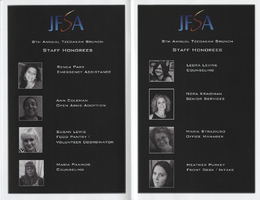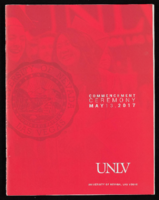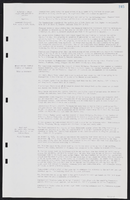Search the Special Collections and Archives Portal
Search Results
Mabel Hoggard Papers
Identifier
Abstract
The Mabel Hoggard Papers (1903-2011) contain materials related to Hoggard's career as a Las Vegas, Nevada elementary school teacher, her research and civic interests in Las Vegas's predominantly African American Westside communities, and her engagement with civil rights issues. The collection also contains materials about Hoggard's life, including biographical newspaper articles about her childhood, education, work, and family. The collection includes lesson plans, scrapbooks, awards, correspondence, photographs, and physical objects such as a vinyl record and political pins. The bulk of the collection focuses on her life in Las Vegas from approximately 1946-1989.
Archival Collection

Pamphlet from the 8th annual Jewish Family Service Agency Tsedakah event, 2015
Date
Archival Collection
Description
This pamphlet contains statistics about Jewish Family Service Agency services provided to the community, and sponsorship advertisements from local businesses.
Text
Howard Cannon Papers
Identifier
Abstract
The Howard Cannon Papers (1958-1988) contain the personal, administrative, and legislative papers of Howard W. Cannon, U.S. Senator from Nevada between 1959 to 1983. The collection primarily pertains to Cannon's time in office from the 86th Congress in 1959 to the 97th Congress in 1983. Materials include correspondence, speech transcripts and supporting research material, press releases, reports, memoranda, newspaper and magazine clippings, and Senate voting records. The collection also includes constituent correspondence and casework related to legislative issues such as foreign relations, social security, veterans, tax reform, labor, aviation, nuclear testing and waste, civil rights, and environmental protection.
For a detailed inventory, please contact Special Collections and Archives (special.collections@unlv.edu).
Archival Collection

University of Nevada, Las Vegas (UNLV) Spring 2017 commencement program
Date
Archival Collection
Description
Commencement program from University of Nevada, Las Vegas Commencement Programs and Graduation Lists (UA-00115).
Text

Transcript of interview with Richard Steele and Zakeisha Steele-Jones by Claytee White, February 12, 2015
Date
Archival Collection
Description
Richard Steele became interested in professional boxing at a young age when he was introduced to world champion boxers Chalky Wright and Sugar Ray Robinson. He trained at Hoover Street Gym in South Central, Los Angeles, with trainer Eddie Futch. Richard joined and boxed for the United States Marine Corps and became Marine Corps Middleweight Champion in 1963. Born in Kansas City, Missouri in 1944 Richard and his family moved to Los Angeles, California in the early 1950s. His father was a bartender and his mother was an elevator operator. During the interview Richard’s daughter Zakeisha Steele-Jones discusses the various job titles her father has held, including professional actor and campus police officer. Most notably, Richard was the second Black professional referee in both Los Angeles, California, and Las Vegas, Nevada. A profound interview heralding key character traits, such as, perseverance, resilience, strength, and determination, Richard recalls being personally invited by Nelson Mandela to referee the WBC Convention in South Africa. Some of Richard’s most memorable title fights to date include, the Hearns and Hagler fight, Sugar Ray Leonard and Tommy Hearns, and four Mike Tyson fights. Zakeisha also interjects that her father currently manages and owns a boxing gym where he trains and mentors young Black and Hispanic aspiring boxing champions and referees.
Text

Alber A. Mora oral history interview: transcript
Date
Archival Collection
Description
Oral history interview with Alber A. Mora conducted by Rodrigo Vazquez and Laurents Bañuelos-Benitez on December 7, 2018 for the Latinx Voices of Southern Nevada Oral History Project. Alber Mora talks about his life growing up in Cuba with his family and the circumstances of their departure from the country; his brother faced pressures to join the military, which led the Mora family to immigrate to the United States by way of a fishing boat in 1994. Alber discusses the family's lives in Houston, Texas and how he met and married his wife, Rosemary, before the couple moved to Los Angeles and Alber began working at Porto's Bakery, a famous Cuban eatery in L.A. Alber shares how he and his wife eventually moved to Las Vegas, where he works for Caesar's Palace and for the Culinary Workers Union as a Shop Steward.
Text

Hernando Amaya oral history interview: transcript
Date
Archival Collection
Description
Oral history interview with Hernando Amaya conducted by Laurents Banuelos-Benitez, Marcela Rodriguez-Campo, and Barbara Tabach on October 18, 2018 and December 3, 2018 for the Latinx Voices of Southern Nevada Oral History Project. In this interview, Hernando Amaya talks about his childhood and education in Bogota, Colombia. He discusses his start in journalism as a young man and working for El Espectador, the Colombian national newspaper. He discusses his experiences reporting on the narco-terrorism occurring in Medellin, Colombia and how this eventually led to his immigration to the United States. Amaya moved to Las Vegas, Nevada in 2001 and continued his career in journalism by working for local Spanish speaking papers and websites. He relates his civic involvement in the Las Vegas area, his work as the president of the Colombian Association of Las Vegas, and various other civic engagements. As a journalist, he asserts the importance of knowing one's culture, storytelling, learning history, and being active in the community.
Text


